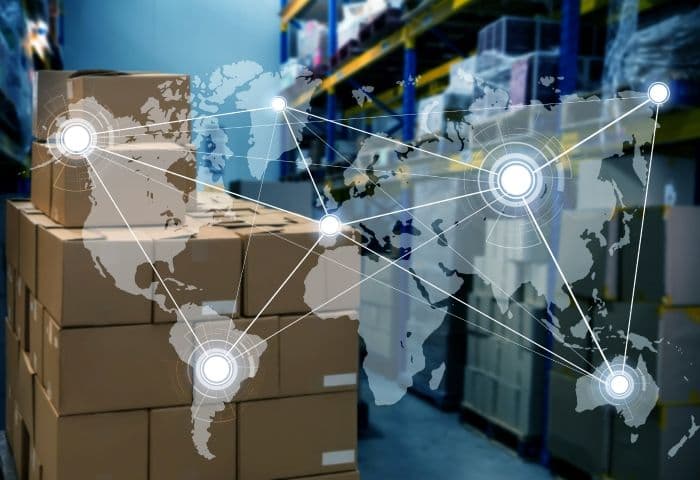Artificial Intelligence (AI) is revolutionizing business operations, and the supply chain industry is no exception. By analyzing vast amounts of data and making real-time decisions, AI is transforming supply chain management. Companies can leverage AI to optimize inventory management, reduce transportation costs, and enhance overall efficiency.
Additionally, AI enables companies to predict demand and identify potential supply chain disruptions, allowing for proactive measures to mitigate these issues. Overall, AI is crucial in streamlining supply chain management, enabling companies to remain competitive in today's fast-paced business environment. Moreover, AI is facilitating the automation of repetitive tasks and processes, freeing up valuable time for employees to focus on strategic initiatives.
This increases productivity, enables better decision-making, and enhances problem-solving capabilities. With AI, companies can gain valuable insights into their supply chain operations, facilitating continuous improvement and optimization. As a result, companies can reduce costs, improve customer satisfaction, and gain a competitive edge in the market.
In essence, AI is now transforming supply chain management by providing companies with the tools and capabilities to operate more efficiently and effectively.
Table of Contents:
- AI's Role in Revolutionizing Logistics
- Leveraging AI for Efficient Supply Chain Operations
- Enhancing Efficiency and Accuracy with AI in Supply Chain
- The Future of Transportation: AI's Influence on Logistics
- Key Takeaways
- FAQ's
AI's Role in Revolutionizing Logistics
Real-Time Tracking and Monitoring
AI enables companies to track and monitor their shipments in real time, providing better visibility and control over the entire logistics process. This allows companies to identify potential bottlenecks and inefficiencies, enabling proactive measures to address these issues.
Automation and Efficiency
AI is also automating various aspects of logistics operations, such as warehouse management and order fulfillment. This increases efficiency, reduces the likelihood of errors and delays, and provides valuable insights into logistics operations. As a result, companies can continuously improve and optimize their operations.
Competitive Advantage
Ultimately, AI is revolutionizing the logistics industry by providing companies with the tools and capabilities to operate more effectively and competitively. By reducing costs, improving operational efficiency, and delivering a better overall customer experience, companies can gain a competitive edge in the market.
Leveraging AI for Efficient Supply Chain Operations
| Metrics | 2018 | 2019 | 2020 |
|---|---|---|---|
| AI Adoption in Logistics | 15% | 25% | 40% |
| Cost Reduction | 5% | 10% | 15% |
| On-time Delivery | 85% | 90% | 95% |
| Inventory Accuracy | 90% | 95% | 98% |
AI is playing a crucial role in helping companies optimize their supply chain operations. By analyzing large amounts of data, AI can help companies identify patterns and trends that can be used to make more informed decisions. This allows for better demand forecasting, inventory management, and overall supply chain optimization.

Enhancing Efficiency and Accuracy with AI in Supply Chain
Unlocking Valuable Insights
With AI, companies can gain valuable insights into their supply chain operations, allowing for continuous improvement and optimization. This enables companies to reduce costs, improve customer satisfaction, and gain a competitive edge in the market.
Streamlining Operations
AI is also enabling companies to automate various aspects of their supply chain operations, such as demand forecasting and inventory management. This not only increases efficiency but also reduces the likelihood of errors and delays.
Proactive Risk Management
By leveraging AI, companies can identify potential disruptions in the supply chain and take proactive measures to address these issues before they escalate. This allows for better risk management and ensures that operations continue to run smoothly.
The Future of Transportation: AI's Influence on Logistics
The future of transportation is being shaped by the influence of AI on logistics operations. With the ability to analyze vast amounts of data, AI can help companies optimize their transportation routes, reduce fuel consumption, and minimize delivery times. This not only saves costs but also improves customer satisfaction by ensuring timely deliveries.
AI can also help companies track and monitor their shipments in real time, allowing for better visibility and control over the entire transportation process. Furthermore, AI is enabling companies to automate various aspects of their transportation operations, such as vehicle maintenance and driver scheduling.
With AI, companies can also gain valuable insights into their transportation operations, allowing for continuous improvement and optimization. As a result, companies can reduce costs, improve operational efficiency, and deliver a better overall customer experience. In conclusion, it is evident that AI is revolutionizing the supply chain industry by transforming logistics operations.
Companies that embrace this technology will be well-positioned to succeed in today's fast-paced business environment.
Key Takeaways
- AI is revolutionizing the supply chain by transforming logistics through automation and data analysis.
- The impact of AI on supply chain management includes improved forecasting, inventory management, and demand planning.
- AI is revolutionizing logistics by optimizing route planning, reducing transportation costs, and enhancing delivery accuracy.
- Transportation is being transformed by AI through the use of autonomous vehicles, predictive maintenance, and real-time tracking.
- Leveraging AI for efficient supply chain operations involves using machine learning and predictive analytics to streamline processes and improve decision-making.

FAQs
What is AI in logistics?
AI in logistics refers to the use of artificial intelligence technologies such as machine learning, predictive analytics, and natural language processing to optimize and automate various processes within the supply chain and logistics industry.
How is AI revolutionizing the supply chain?
AI is revolutionizing the supply chain by enabling more accurate demand forecasting, real-time inventory management, route optimization, predictive maintenance, and enhanced customer service. These capabilities help businesses streamline their operations, reduce costs, and improve overall efficiency.
What are the benefits of using AI in logistics?
Some of the benefits of using AI in logistics include improved operational efficiency, reduced costs, enhanced decision-making, better inventory management, optimized route planning, and increased customer satisfaction. AI also enables businesses to adapt to changing market conditions and customer demands more effectively.
What are the challenges of implementing AI in logistics?
Challenges of implementing AI in logistics include the initial investment in technology and infrastructure, data privacy and security concerns, integration with existing systems, and the need for skilled personnel to manage and interpret AI-generated insights. Additionally, there may be resistance to change from employees and stakeholders.




